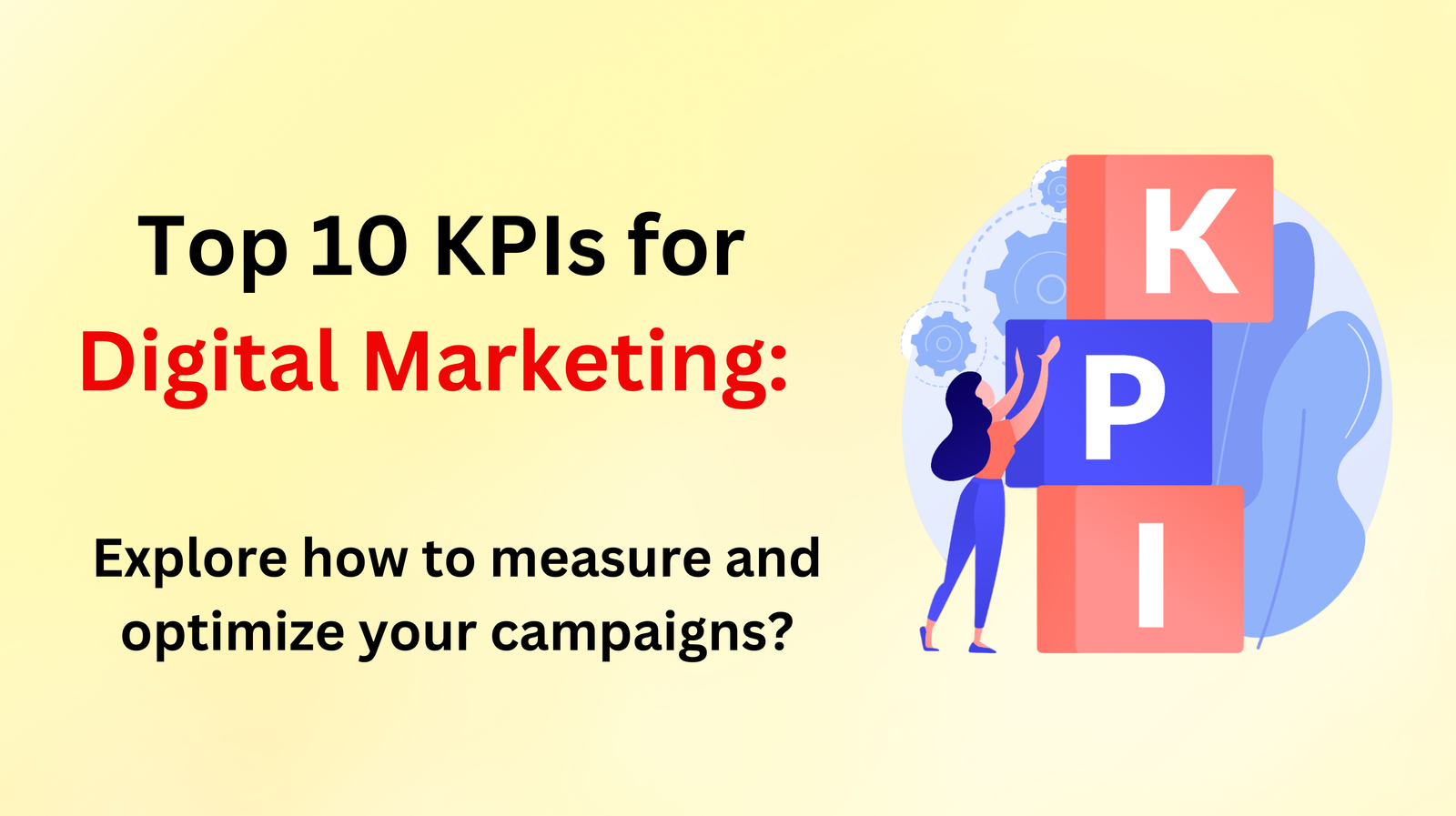Table of Contents
- Introduction
- What are KPIs in digital marketing?
- Importance of KPIs for digital marketing
- Top 10 KPIs for digital marketing
- Conversion rate
- Return on investment (ROI)
- Click-through rate (CTR)
- Customer acquisition cost (CAC)
- Website Traffic
- Engagement metrics
- Lead generation metrics
- Brand awareness metrics
- Email marketing performance
- Social media KPIs
- How to measure KPIs for digital marketing
- Tools for tracking KPIs
- Optimizing marketing campaigns based on KPI data
- Conclusion
Introduction
In today’s fast paced digital world, businesses must navigate a myriad of marketing strategies to stay ahead. With so many online channels available, from social media to email campaigns, how can marketers effectively track and measure their performance? The answer lies in understanding and leveraging KPIs for digital marketing.
Key Performance Indicators (KPIs) serve as measurable values that indicates how effectively a company is achieving key business objectives. By focusing on the right KPIs, digital marketers can assess their digital marketing strategy, optimize their campaigns, and ultimately drive better results. In this blog, we will explore the top 10 KPIs crucial for measuring and optimizing digital marketing campaigns.
What are KPIs in digital marketing?
KPIs in digital marketing are quantifiable metrics that help businesses evaluate their performance and success of their marketing efforts. These indicators are tied directly to business goals, which enable companies to track progress, identify areas for improvement, and make data-driven marketing decisions. By focusing on KPIs marketers can ensure that their strategies align with organizational objectives and provide a clear roadmap for measuring marketing success.
Importance of KPIs for digital marketing
Understanding importance of KPIs in digital marketing is essential for any organization looking to enhance its performance. Here are several important reasons why Key Performance Indicators (KPIs) are significant:
- Performance tracking: KPIs provides insight into how well marketing efforts are performing against set objectives, allowing businesses to make informed adjustments.
- Benchmarking: By establishing benchmarks for performance companies can keep an eye on their progress over time and against competitors.
- Informed decision making: Data-driven decisions provide a more dependable basis for action compared to relying solely on intuition. KPIs guide marketers in understanding what strategies are effective and what needs to be improved.
- Accountability: KPIs create accountability among team members by setting clear expectations for performance.
- Resource allocation: By identifying which campaigns are yielding the best results, businesses can allocate resources more effectively.
Top 10 KPIs for digital marketing
Now we understood the importance of KPIs in online marketing efforts, let’s dive into the top 10 KPIs that can significantly impact your digital marketing campaigns:
1. Conversion rate
The conversion rate is one of the most critical KPIs for any digital marketing campaign. The term refers to the proportion of users who complete a specific desired action such as purchasing a product, subscribing to a newsletter, or submitting a contact form.
Formula:
Conversion Rate= (Number of Conversions / Total Visitors) × 100
A high conversion rate indicates that your marketing strategy effectively convinces users to take action. To optimize conversion rates, consider A/B testing your landing pages, improving user experience, and enhancing your call-to-action (CTA) elements.
2. Return on investment (ROI)
ROI is crucial KPI that measures the profitability of your marketing campaigns. It helps you understand how much revenue your marketing efforts generate relative to their costs.
Formula:
ROI= (Net Profit / Cost of the Campaign) × 100
Calculating ROI help to evaluate the financial performance of your marketing strategies, enabling you to make well-informed budget decisions and optimize resource allocation for future campaigns.
3. Click through rate (CTR)
CTR measures the effectiveness of your online advertising and email campaigns by calculating the percentage of people who click on your link after viewing it.
Formula:
CTR= (Total Number of Clicks / Total Impressions) × 100
A higher Click-Through Rate (CTR) demonstrates that your content is effectively engaging your audience and aligning with their interests, indicating a strong connection between the message and the target audience needs. Improving your ad copy, visuals, and targeting can help increase your CTR.
4. Customer acquisition cost (CAC)
Customer Acquisition Cost (CAC) is the total amount spent to bring new customer, covering all expenses associated with marketing and sales activities.
Formula:
CAC= (Total Marketing Costs+Total Sales Costs) / Total Number of New Customers
By keeping CAC low while increasing customer lifetime value (CLV) businesses can improve profitability. Regularly reviewing and optimizing your marketing channels can help reduce CAC.
5. Website traffic
Website traffic refers to the number of visitors who access your site serving as a key indicator of the effectiveness of your marketing efforts. This KPI can be broken down into different sources, such as organic search, paid search, social media, and referrals.
Measurement: Use tools like Google Analytics to track website traffic sources and analyze user behavior on your site.
6. Engagement metrics
Engagement metrics, such as likes, shares, comments, and time spent on site, provide insight into how well your audience interacts with your content. High engagement levels demonstrate that your content effectively resonates with the audience.
Measurement: Track engagement through social media analytics and website analytics tools.
7. Lead generation metrics
Lead generation metrics measure how many leads your marketing efforts generate, focusing on prospects that have shown interest in your product or service.
Key Metrics:
- Number of leads generated
- Lead conversion rate
- Cost per lead (CPL)
Formula for Cost per lead:
CPL= Total Marketing Expenses / Number of Leads
8. Brand awareness metrics
Brand awareness metrics tell how well your brand is recognized in the market. This can include metrics such as social media mentions, direct traffic, and brand search volume.
Measurement: Use tools like Google Trends and social media monitoring platforms to gauge brand awareness.
9. Email marketing performance
Email marketing continues to be one of the most impactful channels in the field of digital marketing. Measuring the performance of your email campaigns helps determine their effectiveness.
Key metrics:
- Open rate
- CTR
- Conversion rate from emails
Formula for Open rate:
Open Rate= (Total Opens / Total Emails Sent) × 100
10. Social media KPIs
Social media KPIs help measure the effectiveness of your social media campaigns. These metrics may encompass increases in follower counts, engagement levels, and click-through rates resulting from social media posts.
Measurement: Utilize social media analytics tools to track these KPIs effectively.
How to measure KPIs for digital marketing?
Measuring KPIs requires a systematic approach. Here are the steps to effectively measure KPIs in your digital marketing campaigns:
- Define clear objectives: Define your marketing objectives clearly, which may include enhancing brand visibility, generating potential leads, or increasing sales.
- Select relevant KPIs: Choose Key performance indicators (KPIs) that correspond with your business objectives. For instance, if your goal is lead generation, focus on metrics like conversion rate and lead generation metrics.
- Set benchmarks: Establish benchmarks based on industry standards or historical performance to gauge success.
- Utilize analytics tools: Use analytics tools like Google Analytics, SEMrush, or HubSpot to gather data and measure KPIs accurately.
- Analyze data regularly: Consistently review your KPI data to uncover trends, recognize achievements, and identify opportunities for enhancement.
- Adjust strategies as needed: Based on your KPI analysis, make necessary adjustments to your marketing strategies to optimize performance.
Tools for tracking KPIs
There are various tools available for tracking KPIs in digital marketing. Some popular options include:
- Google Analytics: An effective tool for monitoring website traffic, analyzing user interactions, and measuring conversion rates.
- SEMrush: Excellent for tracking SEO performance and keyword rankings.
- HubSpot: Offers comprehensive marketing analytics, including email performance and lead generation metrics.
- Hootsuite: Ideal for monitoring social media performance and engagement metrics.
- Mailchimp: Great for tracking email marketing performance and engagement.
Optimizing marketing campaigns based on KPI data
Once you have gathered and analyzed your KPI data it is essential to optimize your marketing campaigns based on the insights gained. Here are some strategies for optimization:
- Identify high performing campaigns: Focus on campaigns that yield high ROI and replicate their success in future efforts.
- Test and experiment: Conduct A/B tests to identify what elements of your campaigns resonate most with your audience, such as different subject lines or ad formats.
- Refine targeting: Utilize data to refine your audience targeting, ensuring that you reach the most relevant demographics.
- Allocate resources wisely: Invest more in successful channels while reallocating resources from underperforming areas.
- Continuously monitor performance: Regularly revisit your KPIs to stay informed about campaign performance and make adjustments as necessary.
Conclusion
Measuring and optimizing KPIs for digital marketing is essential for any business looking to succeed in today’s competitive landscape. By understanding the key performance indicators outlined in this blog, marketers can effectively track their growth and digital marketing strategies, make good decisions, and drive better results. Remember that the digital world is constantly evolving, and regular monitoring of KPIs will enable you to adapt and thrive.
Excite Template is a digital marketing company in Pune committed to offering first class online marketing services in Pune. It has been designed to meet your business needs. We also have comprehensive expertise in website design and development, mobile app development and UI/UX design ensuring to be perfect fit for your digital initiatives. We know the importance of tracking key performance indicators (KPIs) to evaluate marketing performance. Let us help you achieve your market growth goals through strategic targeting and focused metrics. Contact us today to enhance your marketing efforts and improve your digital presence.






